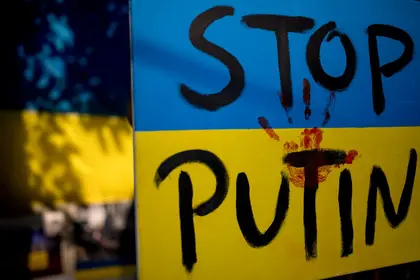As world leaders gather in Davos for the World Economic Forum this week, Ukraine reels from a continuing massive wave of deadly missile attacks from Russia, resulting in more and more needless death and destruction.
The tragic loss of human life in Ukraine, including hundreds of civilians and children, is unfortunately often paid for by cash sent to Russia from Europe and the USA, who are shockingly still doing business as usual regarding much of Russia’s fossil fuel exports.
JOIN US ON TELEGRAM
Follow our coverage of the war on the @Kyivpost_official.
It’s imperative to recognise the critical nexus between energy, conflict, and democracy. Amidst the ongoing struggle for peace and sovereignty in Ukraine, we reiterate our urge to democratic governments: sever the lifeline of Russian oil and gas to halt Putin’s brutal war machine and curb the sprawl of autocracy.
Russia’s unrelenting aggression against Ukraine is sustained by the profits reaped from oil and gas exports. It’s these very profits that enable massive missile and drone strikes on Ukrainian cities, claiming innocent lives and wreaking havoc on civilian infrastructure.
The Kremlin’s war economy thrives on these revenues, sustaining this devastating conflict that claims innocent lives daily. Razom We Stand’s recent report underscores this distressing connection between the profits from the dirty energy trade and the cost of human suffering.

French Policy Playing Into Iranian and Russian Hands
The shadow of Russia’s plans looms ominously, evident in the 2024 federal budget— a staggering allocation of resources to the military-industrial complex, unprecedented since Soviet times. A startling shift in budgetary focus, with a third dedicated to the army, underscores the alarming escalation of aggression.
Russia’s unchecked militarisation signifies a perilous path toward conflict intensification, threatening regional stability and the future of democracy in Europe.
In 2024, Russia’s “national defense” budget will expand to 10.775 trillion rubles ($110 billion), marking a 70% increase from 2023, more than doubling from 2022, and three times higher than the pre-war 2021 allocation.
Regrettably, Europe and the US inadvertently contribute to this war chest by inadequately enforcing sanctions against Russian oil and gas, leaving loopholes wide open that Russia exploits on a daily basis.
The refined oil loophole, meticulously highlighted by Global Witness, remains a massive funding source feeding Russia’s aggression, a fact we cannot overlook.
The urgency for action resonates louder than ever. A ban on Russian LNG imports in Europe should no longer linger as a distant goal set for 2025. The gas storage in Europe is ample, and projections indicate an energy surplus bolstered by record-breaking clean energy expansion and alternative LNG supplies set to come online in 2024.
While commendable, Finland’s pledge to ban Russian LNG must be echoed by immediate, collective action. Europe’s gas reserves, coupled with falling demand and forthcoming alternative LNG supplies, reveal a clear path to severing reliance on Russian imports.
In fact, EU and UK storage sites are likely to end the winter almost 54% full, with a likely range from 42% to 69%.
Ukraine stands ready to bolster the EU’s gas supply security. Our ample gas storage has already proven effective in stabilising winter prices in Europe. As the Financial Times noted, Ukraine can be an instrumental part of the solution, strengthening EU gas supply security.
Across the Atlantic, US LNG exports hit monthly and annual record highs in December, with reports suggesting it has positioned the US to become the largest exporter of LNG in 2023.
The broader message reverberating from Kyiv is a call to end Russia’s stranglehold on dirty energy.
The dire need to end Russia’s energy dominance transcends mere economic or geopolitical strategy — it’s a moral imperative. By severing the lifeline of Russian oil and gas profits, we deny the machinery of aggression its fuel.
We stand not just for Ukraine’s sovereignty but for a world free from the grip of autocratic powers leveraging dirty energy as a weapon of destruction.
The time for transformative change is now. Halting Russian oil and gas isn’t just about ending a war; it’s about dismantling the foundation that enables autocracy to thrive. It’s a global imperative to foster energy independence, peace, climate action and democratic resilience.
As Davos deliberates on the world’s economic future, the call from Kyiv is resolute: put an end to Russian oil and gas, and you will not only end the war in Ukraine but also slow the spread of autocracy and speed up the global energy transition.
The future of democracy, security, and human dignity hinges on this critical moment of action, and leaders at Davos must take action now to stop funding Russia’s aggression.
This article by Svitlana Romanko and Oleh Savytskyi is reprinted from EURACTIV.com.
Svitlana Romanko is Founder and Director of Razom We Stand, a Ukrainian campaign group. Oleh Savytskyi is Campaigns Manager at Razom We Stand.
See the original here.
You can also highlight the text and press Ctrl + Enter






